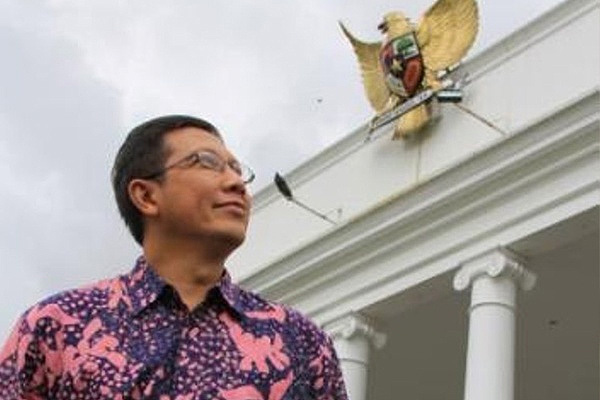
Indonesia to Officially Recognize Baha’i in Increasing Tolerance
- By Alison Lesley --
- 04 Aug 2014 --

Lukman Saifuddin, the new Religious Affairs Minister of Indonesia, has called for the Baha’i Faith to become the next state-recognized religion.
In a response to a query from the Home Affairs Ministry regarding the status of the religion, Lukman asserted that Baha’i is protected under the Indonesian Constitution, and added that adherents should thus be given official recognition by the state. This would allow Baha’i followers to list their religion on all official documents such as identity cards, licenses, certificates, and property deeds, which can be difficult to obtain for Indonesia’s religious minorities. Many believe that this move, along with the election of Joko “Jokowi” Widodo, proves that Indonesia is becoming a more tolerant and open society.
In 2000, Baha’i was legalized in Indonesia, a country with a high degree of religious diversity. The Indonesian state officially recognizes six different religions: Islam, Catholicism, Buddhism, Protestantism, Hinduism, and Confucianism. With the recent call from Lukman Saifuddin for Baha’i to be granted official status, it may be set to become Indonesia’s seventh official faith. Due to its diversity and the close proximity of mutually opposed religious faiths, Indonesia has struggled with religious violence between certain sects. Despite this, however, Baha’i enjoys more freedoms there than in nations such as Iran and Egypt where it is still heavily restricted.
Lukman’s desire to officially recognize Baha’i was met with mixed reactions in the country, with some opposing the proposal, and others stating that the Indonesian government should recognize all faiths. Bonar Tigor Naipospos, deputy chairman of Setara Institute and advocate of religious freedom, asserted, “The Constitution never mentioned official religions — it only said that people are free to hold a religion or belief and worship according to their religion and belief. The problem is with the Religious Affairs Ministry, which in this case being exclusive and discriminative.”
Many local officials throughout the country are loath to grant official documents such as licenses and permits to groups and individuals who do not adhere to one of the state-recognized faiths, making life difficult for religious minorities. Lukman, posting from his Twitter account, stated that the Religious Affairs Ministry is reviewing the issue. If Baha’i is granted official status as Indonesia’s seventh state-recognized religion, this may indicate that Indonesia is becoming more open to religious minorities, giving hope to adherents of smaller faiths throughout the nation. Ismail Hasani of the Setara Institute declared that Lukman’s openness gives minorities “hope for the strengthening of religious tolerance.”
Baha’i is a monotheistic religion native to Persia. Founded in the 19th century, its leader was exiled from Persia to the Ottoman Empire, where he died a captive. The faith then later spread to Iran, where it is still heavily persecuted. It is estimated that there are currently over 5 million adherents to the faith scattered in almost every country in the world. The Baha’i teachings stress the oneness of God, asserting that all creation comes from Him, and that God speaks through chosen prophets. Baha’i adherents believe that these divine messengers exist in Abrahamic religions such as Islam and Christianity as well as Dharmic faiths such as Buddhism and Hinduism. Baha’i stresses the unity of mankind and the unity of all religions, stating that like all creation, all major religions come from the same God.




















1 comment
Alison Lesley
1:25 pmBaha’ism is a monotheistic religion, BUT its leader claims he is God and creator of multiple Gods:
“There is no God but me the lonely, the imprisoned” (Bahā’u’llāh, Āthār-i Qalam-i A`lā, vol. 1, no. 39, p. 226.)
“All Gods became Gods from the flow of my affairs and all Lords became Lords by the overflowing of my decree (`Abdu’l-Bahā, Makātīb, vol. 2, p. 255
(citing Baha’u’llah))
Its leader claims equality between men and women but believes women are stronger and more important than men:
“‘Abdu’l-Bahā smiled and asked: “What will you say if I prove to you that the woman is the stronger wing?” The answer came in the same bright vein: “You will earn my eternal gratitude!” at which all the company made merry. ‘Abdu’l-Bahā then continued more seriously: “The woman is indeed of the greater importance to the race. She has the greater burden and the greater work. Look at the vegetable and the animal worlds. The palm which carries the fruit is the tree most prized by the date grower. The Arab knows that for a long journey the mare has the longest wind. For her greater strength and fierceness, the lioness is more feared by the hunter than the lion” (`Abdu’l-Bahā, `Abdu’l-Bahā in London, pp. 102–103)
It’s leader claims the Conformance of Science with religion but he believes all planets are inhabited by countless aliens and his son Abdu’l-Baha believes stars too are inhabited by Aliens:
“Know thou that every fixed star hath its own planets, and every planet its own creatures, whose number no man can compute” (Bahā’u’llāh, Gleanings from the Writings of Bahā’u’llāh, p. 163)
“All celestial stars have special creatures. When this planet earth that is
comparably infinitely small is not empty and in vain, then these great
bright shining [heavenly] bodies are a different matter altogether (meaning
they definitely possess life).” (`Abdu’l-Bahā, Muntakhabātī az makātīb Ḥaḍrat `Abdu’l-Bahā, vol. 6, no. 480)
To understand the numerous contradictions in this creed read the following book:
“Twelve Principles: A Comprehensive Investigation on the Baha’i Teachings”
http://www.avazedohol.com/eng/index.php/download